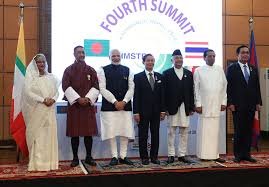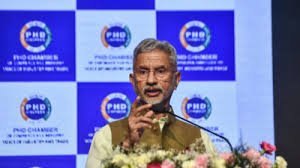The BIMSTEC charter came into effect on May 20, outlining the future goals and key focus areas of the member countries – Bangladesh, Bhutan, India, Myanmar, Nepal, Sri Lanka, and Thailand – and setting up the necessary structure for collaboration in the region.
The BIMSTEC charter was signed and approved at the fifth summit of the organization in Colombo, Sri Lanka, in March 2022. Following the approval of the charter by Nepal’s Parliament in April, all member states have now ratified the foundational document and the charter has taken effect.
The implementation and establishment of the charter demonstrate the collective dedication of member states to enhance regional collaboration in important areas like security, connectivity, trade, agriculture, environment, science and technology, agriculture and interpersonal connections.
The combined population of the seven BIMSTEC member countries accounts for almost a quarter of the world’s population and their total GDP is $3.6 trillion.
Due to disagreements between India and Pakistan, cooperation within the South Asian Association for Regional Cooperation (SAARC) has come to a halt, prompting New Delhi to enhance regional collaboration through BIMSTEC and BBIN with Bangladesh, Bhutan, India, and Nepal.
The charter grants “legal personality” to the group, allows for the addition of new members and observers, and permits the signing of agreements with countries or organizations.
The activation of the charter for the Bay of Bengal Initiative for Multi-Sectoral Technical and Economic Cooperation (BIMSTEC) is anticipated to boost India’s role as a prominent group in the region.
Secretary General of BIMSTEC visits Nepal
Indra Mani Pandey, the Secretary General of BIMSTEC, emphasized the importance of the BIMSTEC Charter coming into effect, expressing optimism for increased cooperation in the region.
The BIMSTEC Secretariat announced on Thursday that he is currently visiting Nepal starting from May 19.
Nepal is part of the BIMSTEC alliance along with six other countries. It is characterized by stunning mountains, lakes, and valleys, and is known for its diverse religious and cultural groups.
While visiting, the Secretary-General phoned President of Nepal Ramchandra Paudel on May 21 at Shital Niwas, the Presidential Palace, and briefed him on the current status of regional cooperation in the Bay of Bengal region under the BIMSTEC framework.
The President emphasized the importance of BIMSTEC as the platform connecting the Himalayan mountain ecosystem with the Bay of Bengal’s marine ecosystem, while also recognizing Nepal’s substantial role in promoting regional cooperation.
Later on the same day, the Secretary-General visited Prime Minister of Nepal Pushpa Kamal Dahal ‘Prachandra’ at Singha Durbar and sought Nepal’s ongoing assistance in enhancing regional cooperation in the Bay of Bengal area through BIMSTEC.
The Prime Minister highlighted the significance of BIMSTEC in achieving peace, security, and prosperity for its Member States, expressing Nepal’s unwavering commitment to advancing BIMSTEC’s objectives after attending the 2016 Retreat in Goa hosted by Prime Minister Narendra Modi.
He was optimistic that the upcoming Summit would bring a fresh enthusiasm to regional cooperation within BIMSTEC.
Earlier on the same day, the Secretary-General had a discussion with Deputy Prime Minister and Minister for Foreign Affairs Narayan Kaji Shrestha regarding the current level of cooperation within BIMSTEC, future plans, and Nepal’s important role within the organization.
The Secretary General summoned Foreign Secretary Sewa Lamsal, Energy, Water Resources, and Irrigation Secretary Sushil Chandra Tiwari, and Home Affairs Secretary Eaknarayan Aryal.
In addition to the formal meetings, the Secretary-General gave a speech on ‘Utilizing Regional Synergies for Development and Prosperity in the BIMSTEC Region’ at an event hosted by the Centre for Economic Development and Administration (CEDA) at Tribhuvan University.
Eminent individuals, diplomats, scholars, researchers, students, and the media were present at the event.
The Secretary-General also explored different cultural landmarks in and around the Kathmandu Valley.
EAM S Jaishankar on BIMSTEC Charter
S Jaishankar, the external affairs minister, praised the implementation of the BIMSTEC charter, stating that it shows India’s dedication to a prosperous, peaceful, and sustainable neighborhood.
The entry into force of the BIMSTEC Charter reaffirms 🇮🇳’s commitment to a prosperous, peaceful and sustainable neighbourhood. It is achieved by building on our shared history, culture, vision and mutual respect for each other.
BIMSTEC reflects the synthesis of our Neighbourhood… https://t.co/U86WjRgQ8E
— Dr. S. Jaishankar (Modi Ka Parivar) (@DrSJaishankar) May 21, 2024
This is accomplished by leveraging our common history, culture, goals, and mutual respect towards one another. In a post on X, he stated that “BIMSTEC embodies the combination of our Neighbourhood First and Act East policies!”
“The charter gives legal status to the grouping, allows new members and observers to join, and permits agreements with countries, sub-regional, regional, and international organizations.”
According to external affairs ministry spokesperson Randhir Jaiswal, “the progress represents an important achievement and sets the stage for substantial collaboration and increased unity in the Bay of Bengal area”.
The advancement marks an important stage and offers a structure for substantial collaboration and enhanced integration of the Bay of Bengal region, according to external affairs ministry spokesperson Randhir Jaiswal’s statement on X.










